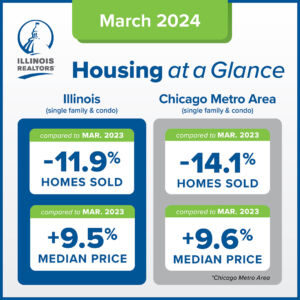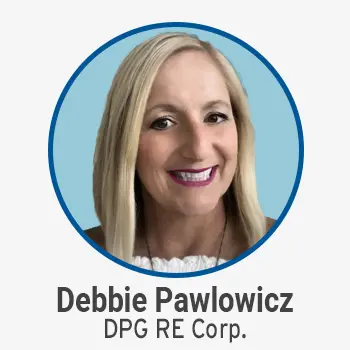Three Legislative Initiatives for Designated REALTORS® to Know
The recently completed legislative session in Springfield was very eventful. For the busy Designated REALTOR®, review these three statutory changes for upcoming action items affecting your practice:
1.Amendment to the Illinois Residential Real Property Disclosure Act (the Act) – HB 2098 – effective immediately upon Governor’s signature
Definition of Seller gets a “new” limitation
This is correct. You are not seeing things. The recently revised Act that became effective in May 2022 is already being amended. Many of the definitions remained similar to the prior version, but in the cleanup, there was an unintended consequence involving the definition of “seller”. This definition is important because, with a few exceptions as defined in the Act, the seller must complete the disclosure report for residential sales transactions.
Seller is a defined term in the Act and means…” every person or entity who:
(1) is a beneficiary of an Illinois Land Trust; or
(2) has an interest, legal or equitable, in residential real property as:
(i) an owner.
(ii) a beneficiary of a trust.
(iii) a beneficiary pursuant to testate disposition (with a will), intestate succession (without a will), or a transfer on death instrument; or
(iv) a contract purchaser or lessee of a ground lease.
Including the unmodified “beneficiary of a trust” produced the unintended consequence of requiring many more folks to fall under the definition of seller if not otherwise excluded under the Section 15 exemptions.
The Section 15 exemptions remain the same. The amendment provides that the definition of seller now does not include a beneficiary who both (i) never occupied the residential real property AND (ii) never had management responsibility for it. (Emphasis added and, as a special note, this language did appear in the original act but did not get picked up in the revision.)
The bottom line here is if a seller is a beneficiary who does not fall under one of the exemptions and has never lived in the property and never had management responsibility for it; that beneficiary does not have a duty to complete a disclosure report. However, if the beneficiary is not otherwise exempt, and the beneficiary does live in the property, or doesn’t live there but does manage the property, i.e., as an absentee owner, that beneficiary will be a seller by definition and need to complete a disclosure report to the best of the beneficiary’s actual knowledge.
3.Illinois Real Estate License Act (RELA) – SB 1866, legislative pp. 53-110
Effective 01.01.2024
Omnibus Bill containing Real Estate License Act revisions
Most of the changes to RELA were non-substantive, like changing pronouns or the way to which something was referred.
- The cumulative time limit for a member of the Real Estate Administration and Disciplinary Board was changed from 10 to 12 years and terms remain four years long.
- RELA was amended in three ways to clarify a prohibition against locking a seller into an agreement to list their home for a very long time and a prohibition against filing a lien or anything purporting to be a lien against the property to assure payment of a residential commission or compensation. There are no property lien rights for commissions or compensation residential sales transactions in Illinois.
- Section 1-10 definition of “brokerage agreement” inserts the clause “or the performance of future activities” into the existing definition:
“Brokerage agreement” means a written or oral agreement between a sponsoring broker and a consumer for licensed activities, or the performance of future licensed activities, to be provided to a consumer in return for compensation or the right to receive compensation from another….
- Section 10-25 is amended to say that a written brokerage agreement must either have a definite termination date, or in any event, if it is effective for longer than one year, the client must receive an annual right to terminate by giving no more than 30 days’ written notice.
No licensee shall obtain any written brokerage agreement that does not either provide for automatic expiration within a definite period of time, and if longer than one year, provide the client with a right to terminate the agreement annually be giving no more than 30 day’s prior written notice. Any written brokerage agreement not containing such a provision shall be void.
- Section 20-20(a) adds new subparagraph (47) which states that it is a violation of the Real Estate License Act to file liens or record written instruments for non-commercial, residential real property that relates to the broker’s compensation for licensed activity under the Act. Note that there have not ever been property lien rights for residential transactions.
For a more complete list of all relevant action visit our Advocacy page, read “At the Capitol: Inventory, Rentals, Fair Housing & More” in the latest online issue of Illinois REALTOR® and review the State Capitol Report.
Stay tuned to all Illinois REALTORS® channels for updates on all these statutory changes as they become effective.
About the writer: Elizabeth A. (Betsy) Urbance, General Counsel and Vice President of Legal Services has served the association’s members as General Counsel since 2018 and prior to that she was Legal Hotline Attorney since 1994. Urbance is a 1984 graduate of Western Illinois University and received her law degree from the University of Missouri School of Law in 1987. She is licensed in both Illinois and Missouri.





 Create professional development programs that help REALTORS® strengthen their businesses.
Create professional development programs that help REALTORS® strengthen their businesses.
 Protect private property rights and promote the value of REALTORS®.
Protect private property rights and promote the value of REALTORS®.
 Advance ethics enforcement programs that increase REALTOR® professionalism.
Advance ethics enforcement programs that increase REALTOR® professionalism.
 Protect REALTORS® by providing legal guidance and education.
Protect REALTORS® by providing legal guidance and education. Stay current on industry issues with daily news from Illinois REALTORS®, network with other professionals, attend a seminar, and keep up with industry trends through events throughout the year.
Stay current on industry issues with daily news from Illinois REALTORS®, network with other professionals, attend a seminar, and keep up with industry trends through events throughout the year.


